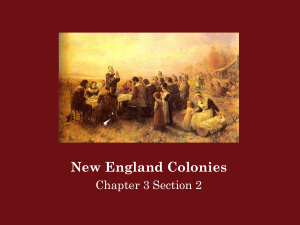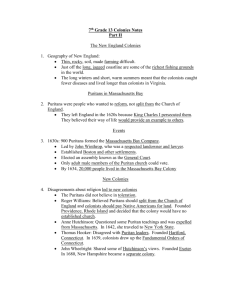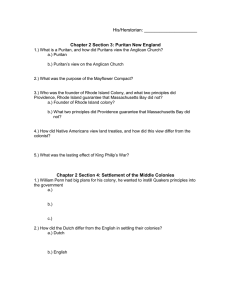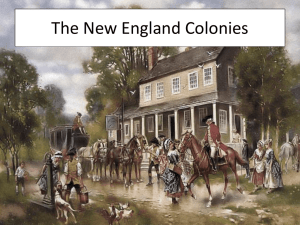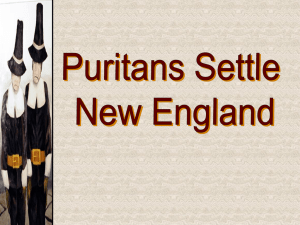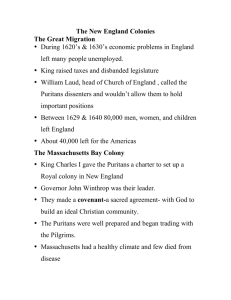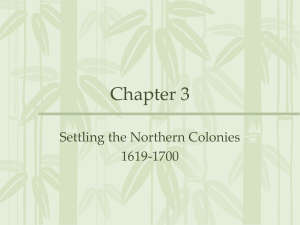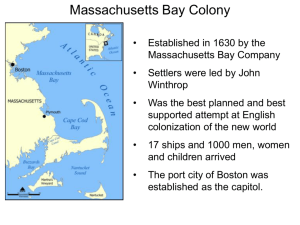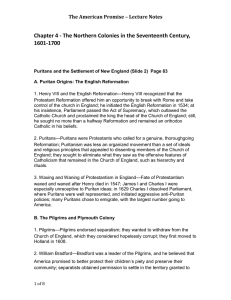The Settlement of New England The New England Colonies
advertisement
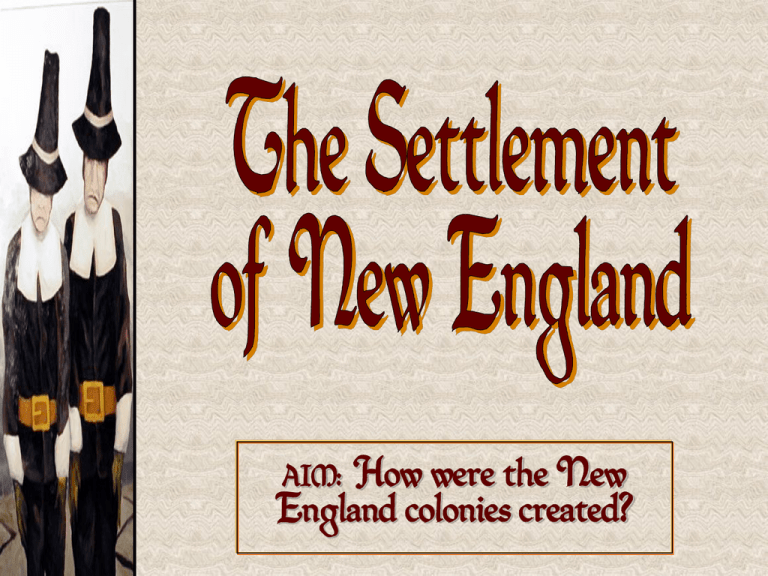
How were the New England colonies created? AIM: The New England Colonies Massachusetts Connecticut Rhode Island New Hampshire Who were the Puritans? Wanted to purify (reform the Church of England Disliked organ music, fancy churches Persecuted by King Charles I • Believed all human beings were evil • Satan was always present • Citizens found guilty of sins were humiliated – Letters on back – Dunked in ponds – Stand in pillories Religious Persecution STOCKS 1. The Massachusetts Bay Colony 1629 Puritans get a royal charter to form the MA Bay Colony. Wanted to escape religious persecution 1630 1,000 people set off in 11 well-stocked ships Established a colony with Boston as its hub. Called “Great Migration” of the 1630s The Great Migration • Why did the Puritans leave England? – Religious freedom – Escape persecution from King Charles I 15,0000 journey to Mass. Who was their leader? John Winthrop- Wealthy attorney and manor lord Devout Puritan Became 1st governor of Massachusetts. Believed that he had a “calling” from God to lead there. Set an example by working hard to clear land & build a home Served as governor or deputygovernor for 19 years. “We shall be as a city on a hill..” The Puritans Arrive What was life like in the New England settlements? Low mortality average life expectancy was 70 years of age. Average 6 children per family. Average age at marriage: Women – 22 years old Men – 27 years old. Who was the boss of the family? Male father figures controlled each household. Called a patriarchal society Ministers and magistrates controlled church & household patriarchs. 2. Connecticut – Founder-Thomas HookerPuritan minister – Believed govt had too much power – Left Massachusetts Bay & started a new colony – 1636 Government of Connecticut • Fundamental Orders of Connecticut – All men with property could vote, even if not Church members – Limited governor’s power Another Puritan “Rebel” Roger Williams- young, popular minister in Salem. Believed church & state (govt) should be separate 1635 found guilty of preaching new & dangerous opinions and was exiled. Roger Williams 3. Rhode Island 1636 Roger Williams founds Rhode Island. Remarkable political freedom in Providence, RI • • • • • No special privileges for anyone freedom of opportunity for all. Fair to Native Americans All white men can vote No one has to go to Church. RI becomes known as the “Sewer” -seen by the Puritans as a dumping ground for unbelievers More liberal than any other colony! 3. Rhode Island Another Puritan “Rebel” Anne Hutchinson Intelligent, strong-willed, well-spoken woman. Devout Puritan Discussed sermons Believed holy life was no sure sign of salvation. Anne Hutchinson’s Trial 1638 – lasted 2 days Finally stated she had received her beliefs DIRECTLY from God. Puritan leaders banished her she & her family traveled to RI and later to NY. She and all but one member of her family were killed in an Indian attack in Westchester County. John Winthrop saw God’s hand in this! BANISHED Puritans vs. Native Americans Indians especially weak in New England epidemics wiped out ¾ of the native popul.. Some colonists like Thomas Hooker & Roger Williams were fair but……. But…. The English keep coming & taking… More settlers take more land War begins- 1675 Metacom [King Philip to white settlers]- chief of Wampanoag Indians Other tribes unite with them & 600 settlers are killed King Philip’s War (1675-1676} The war ended in failure for the Indians Metacom beheaded and drawn and quartered. His son and wife sold into slavery. Never a serious threat in New England again!! • Describe the Sabbath: – Holy Day – Nobody could talk, joke, drink – Everybody attended church Purpose: – Vote or make decisions – Took place at church – Made strict religious laws • Economy of New England: – Shipbuilding (trees from forests) – Hunted in forest- wild turkey, deer – Fishing and whaling from ships New England Spreads Out New England Colonies, 1650 Population of the New England Colonies
